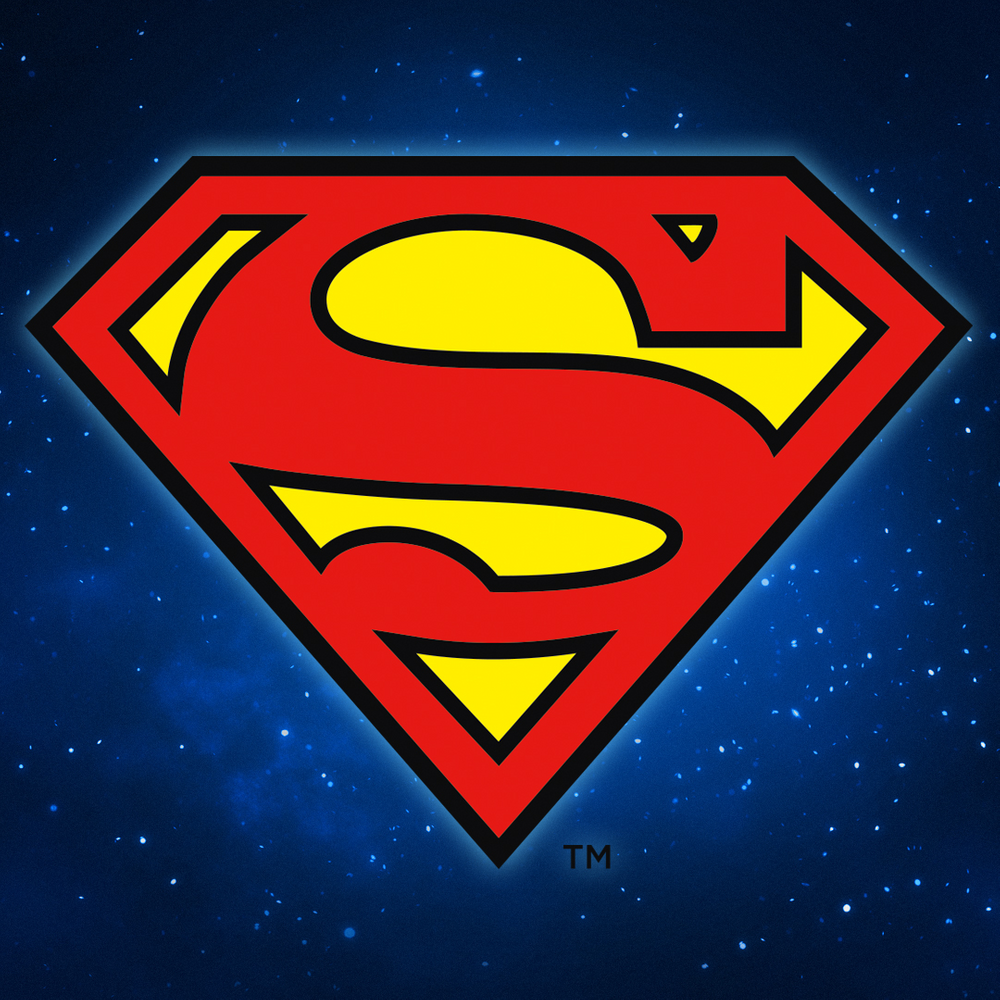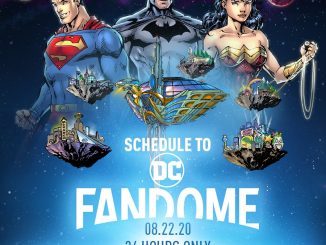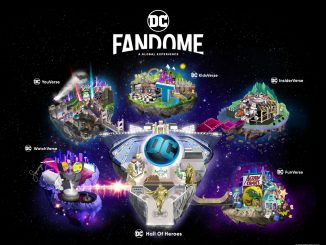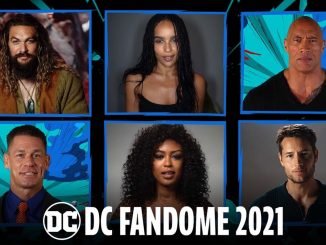
Superman Homepage reporter Michael Moreno watched the 25 minute panel titled “Superman: An Enduring Symbol of Hope”, which was made available on demand on Saturday, September 12 in the WatchVerse section of DC FanDome, and filed this report:
During the “Superman: An Enduring Symbol of Hope” panel at DC Fandome, Brian Michael Bendis (writer of Superman, Action Comics and Legion of Super-Heroes) interviewed Superman comics legend Dan Jurgens and graphic novelist Gene Yang. Gene Yang is the creator of Chinese-born Superman Kenan Kong and has authored the new release, “Superman Smashes the Klan,” for DC Comics.
Brian: Now Superman we all feel it, we are actively with him all the time. Let’s talk a little bit about how you feel in this world we’re living in right now, and how Superman is kind of reflecting in your world.
Dan: I am often asked if we’ve kind of passed the time for Superman, because some people look at him as the big blue boy scout or whatever, and have we moved beyond that. And I think it’s just the opposite, where we have to move more into that realm. That if Superman stands for truth and justice, if we move beyond that, then that says more about us than it does Superman. And that’s where I say we have to move back to those standards.
Brian: That’s interesting. The other question I had for you specifically – and I have just entered the realm of having been a writer for so long that you can reflect back on work you did at another time ago. Wow, that was a whole different universe; the whole world was different when I was writing that character. Can you do that now? Can you reflect back on the Superman you were writing for at different times and how it felt?
Dan: Oh absolutely. You know part of it is – I could go back to a different time where it was several presidents ago. For example, when we did the “Death of Superman” story, we had Bill Clinton (who was just elected president at the time), show up at the funeral. So I think that it really shows how much the world has changed, and how we have changed societally. So, yeah, I think you could look back on it, and then you say, “What would my work have been like if things had been then as they are now?” So there’s an internal list of questions that we can kind of play with there. But it is true that Superman remains the constant, and I think that that’s just awesome.
Brian: Gene, same for you. With you, I feel more of an immediate connection, because we made some similar choices. But, even from the time when you were writing Superman and I was writing Superman, the world has shifted dramatically. We’re getting different truths from it.
Gene: Yeah
Brian: But you have come into the character in one of the most unique ways a few times.
Gene. Well, thanks. It’s really is an honor to be on this panel with the two of you. And, as Dan said, I think Superman is always relevant, because he represents hope, and hope is always relevant. Unfortunately, I think we need hope more than ever right now. It kind of feels like the world is cracking, almost, and the only thing that is going to hold it together is hope. My most recent Superman project is Superman Smashes the Klan, which is an adaptation of one of the most famous story lines from the Superman mythos back in 1946. He fought a group of hooded racists on his radio show you know. And, when I was working on this adaptation, I actually thought about this a lot. I thought, “Are those themes still relevant to today? Are those themes way back from 1946 still relevant to today?” I think, unfortunately, they are more relevant than ever. And, in a lot of ways, we really need what Superman represents more than ever.
Brian: Yeah It certainly felt like you had a thesis, to even approach this project, and you’re so right, it’s almost sad.
Gene: It is sad
Brian: Wow it reads as if it could happen today, and I couldn’t be in the world more different than what we’re living in right now
Gene: Yeah absolutely.
Brian: So let me ask you, Dan. What was the first Superman story you remember reading that got under your skin, that really resonated with you, do you remember?
Dan: There would actually be a couple of them, one was from Superman – I think 149 something like that – that was re-printed in a 25 cent giant, which was the “Death of Superman”. And it had Superman laying in a sort of glass coffin. And what was so memorable about it was the aliens that came by, and they were standing there talking and thinking about how he could’ve ruled the universe, but he chose to serve others, which I thought, as a kid, when I read it, “Well that’s really awesome, that they have that perspective .”… Another one is a great Elliot Maggin story called Must There be a Superman? And it deals with the concept of what does Superman’s leadership mean, because he lets man make his own decisions. And he serves as an inspirational character by doing that, a sort of guiding light without controlling things. And I think that starts to really define who Superman is, and what he is as a character and a leader.
Brian: That’s great. And Elliot S Maggin, that’s a great call. That’s a very important author to me, too.
Dan: Yeah
Brian: He was like the first prose novel I ever read with superheroes in it.
Dan: Yeah. Yeah
Brain: Just that idea takes the superhero from an external force (that he always is on the page) to the more internalized.
Dan: Right, right
Brian: A novel is more internal, right? So, I think that’s the first time that I got into the skin of a superhero, just because I was reading in a different way. Gene?
Gene: Well, I remember being in college and Dan killed Superman.
(Everyone laughs)
Gene: No, to be honest, that whole sequence of him dying, and then The Reign of the Supermen and him coming back. I think, more than anything, especially the way the world reacted to it, it just showed how important this character is. He’s not just like…He almost extends beyond fiction. We treated his death as if it were a real death. That’s what I remember. I remember people walking around with black armbands with a Superman insignia on it. But, before that, in terms of the first Superman story – I was thinking that I don’t think I can remember. I feel like Superman has always been there, and maybe the starkest Superman related thing wasn’t even a story, it was an experience from when I was a kid. I remember, it was around the time that the Christopher Reeve movie came out, there was an exhibition, and I want to say it was in San Francisco. And it was a bunch of old Superman original art lunchboxes and toys. I remember passing by it with my parents and my little brother, and we peaked inside, and it looked interesting, but we had to buy a ticket to get in. So we stood in front, and we were talking, and my parents were talking to me in Chinese, which I found really embarrassing when I was a kid. But they are talking to me in Chinese, and then the guy at the ticket counter saw us, and was like “come here” and he handed us four tickets, and we walked inside. I just felt like, it just felt really “Superman” to me right? Like this guy sees an immigrant family, and then hands them tickets to come inside and see a display of an American icon.
Brian: That’s amazing! Yeah, I think about when we were asked this question, I was like “Superman has been part of my life at very important moments in my life”. And I know that a lot of people may have had this, but not just like a “human”, but like as my journey as a creative person. Like Superman the Movie came out when I was a kid. It was the first real Superman superhero movie treated seriously by serious filmmakers, and that rattled me, right? And then, when I was in high school and in college, and in comics particularly DC Comics, were having a genuine renaissance with Alan Moore and Frank Miller and George Perez and John Byrne, everyone who was coming in and was really bringing the thunder. There was, you know, whatever happened to the “man of tomorrow”? Which was like, oh my gosh, Superman’s making me cry. So I went from maybe reading silly Superman stories when I was very young, to then experiencing the movie, to then experiencing it as an artistic statement. And then very, very clear memories of the very terrible day that I had at work, working at the comic book store that I worked at on the day that Superman died. And the line was out the door. I remember showing up to work, and it was a comic book store, and there was a line like we are giving out free sandwiches! There was a line, and it was it was barricaded, downtown Cleveland, a very large mall-like situation, and we had a line! And I remember thinking (as a frustrated comic book creator who couldn’t even get my stuff printed) thinking ,”I quit. I’m out of here!” Honestly I can’t. But my Mom actually called me at work and said, “Is he really dead?” And I was like -“Aahhhh! “- and hung up.
Dan: I got a lot of those calls.
(Everyone laughs)
Gene: And I was in one of those lines! Thanks a lot, Dan.
Brian: That was amazing! So let me ask you, Dan, what was going in your head when you wrote The Death of Superman? Because it is still a seminal storyline. But I was wondering if you can remember back, if you could take yourself to that day?
Dan: Well, there was a group of us writers working on Superman at the time, and we had a great group, and really what we wanted to do….
Brian: And who were the other writers, do you remember?
Dan: The other writers were Louise Simonson, Jerry Ordway, and Roger Stern. We were working under the auspices of Mike Carlin, who was the editor. We were a tight group. What we really wanted to do was address Superman’s importance by removing him from the books. And, I think that Gene touched on this a little bit, when he referenced the idea that, once Superman died, we started seeing columns showing up in the New York Times and so many other places that said. “Well, what does it mean if Superman is gone, and they’ve taken him away from us?” And what it really meant is, not only were our characters in the comics dealing with Superman’s importance, and what he meant to them by him being gone, but we had that happening in real life at the same time. So we had this weird parallel track of fiction and reality, that sort of came together for a while, and it was really neat. And the most important part of it was – just as when we go to a memorial or a wake or something like that – we talk about how important the departed might be to us. That is the exercise that our characters went through. And that was the exercise that society went through, really talking about the importance of Superman. And it was a fun, fun thing to be a part of.
Brian: I think that the lesson from other creators is … you can kill any character, you can do any shocking event to any character, but it’s really about what comes next. What’s the fall out? You guys planned one of the great fall outs of all time. Even working at the comic store, I didn’t see that coming. There were all these other “Supermans” – all of it was fascinating, unique, and could not have happened unless you told the story the way you told it.
Dan: Yes, it was a fun thing to be a part of. And I do think that whenever we write a character – and I’m sure that you two feel the same way – that it’s our job to leave him in a better spot than when we found him, and to add to the tapestry and the legacy of that character. And I like to think that did.
Brain: One hundred percent. And I’m the same way. Gene, you did a whole run where you took away his powers right?
Gene: Yeah
Brian: And that was one of your bigger moves and, in a way, it’s kind of the same thing. But I was curious – What was the impetus towards it, and were you able to get closer to the character’s core by doing so?
Gene: Yeah, that’s right. When I started working at DC comics and I was on a team as well.
Brian: What year was it?
Gene: It was maybe five years ago, so 2014-15, around there. So I was on the main Superman title. Pete Tomasi was doing Superman, Wonder Woman, and Greg Pak and Eric Kuder were on Action Comics. And together we came up with this deep ” power” storyline where we basically backed up his powers all the way to his original set, you know. And, I’ve got to tell you, I was really nervous about it. And that was the very first time I was working on Superman, and I had always wanted to work on classic, what I thought of as the “classic” Superman with a cape, and the flying, and all that, and also with the supporting cast of Jimmy Olsen, Lois Lane, everybody. So I felt really nervous about it. And Greg, who is a really good friend, he’s like, “You can take all this other stuff away, you can take away the cape, you can take away the spit curl. There’s a core to Superman that will always stay there, right?” And the way he kind of talked me through, it was that we were going to strip away all this other stuff, so that we could show off that core. So I had that in mind. I felt like Greg did it a lot better in Action than I did in Superman, but that was the idea – there’s a “core” of Superman that will never change
Brian: Dan, what I think you’ve accomplished on Superman is equal to what Chris (inaudible) did on the X-Men, but because you are a more chill human, people aren’t aware of it. So once I wrap my head around what you have accomplished (I’ve been screaming it since I walked in the door), it is a tremendous accomplishment with the character. Is there anything you felt like you didn’t get to do? Or is there any storyline that, now that you’ve had some distance from it, you go, “How I wish I would’ve….”
Dan: Yeah, it’s funny because, when you’re a writer, the brain keeps cooking, especially as we see the world changing around us. There’s always little things that pop up in your head and just relate to Superman somehow, or to some other characters. And I think there’s always a couple little things that are out there somewhere that I think become relevant… We see that right now, especially since we’ve become more of a society that has chanted to build a wall, which is not at all what Superman is about, for example. So I think that there are always things out there that are a tremendous touch stone for Superman, where they are a key to who he could be, and key points at whatever story he might involve himself with.
Brian: Yeah, it’s funny cause we were all on Twitter. We see it every once in a while where someone gets riled up about “truth, justice, and the American way”. And I pointed out when I first joined the book, I was beyond excited that what was maybe clichéd during some of your run – maybe truth justice and the American way was just kind of like the tag on the poster – they are actually ideals that are under siege in our world that you can’t take for granted. That you have to fight for them, and they’re worth fighting for. And I was so honored that I got to express that idea in a way that’s there’s no politics at all – it’s just the idea of someone using someone’s truth and someone’s justice and weaponizing it against them is unique to our world. And having Superman stand up to that is a great deal of fun to write. Also, I found what a great treat it was to spend a few hours a day with Superman, and particularly in stressful times, and boy did he help me get through all of this.
Dan: Actually I have a question for you, if I may.
Brian: Oh sure.
Dan: When you’re a writer, and you first start writing a character, you have one notion of them. And then you spend a couple of years with that character. And, what I’m intrigued by would be the question, “How has your perception of Superman changed, if it has, and how has a couple of years of writing Superman changed you?”
Brian: That’s an outstanding question, of which I feel you know the answer to. But I will say that I’m still in the middle of that, but I am aware of the question now. Like your question feels very truthful to me, and I’m just wrapping my head around. Like I wrote something that came out this week – I actually felt the pain of writer embarrassment that I had written something so truthful or honest that I was actually embarrassed it put it out. But I didn’t stop myself, and I still did it
Dan: No, it’s hard to do. It’s hard to do
Brian: You get that little “Uuuuh, don’t reject this one.” But I am aware, and I know I told you this before – but I would have never done the father and son stuff of Superman as son and as father. Now, I am a father, and it consumes 85% of my day and it’s all I’m thinking about, so it’s insane to me now that I wouldn’t be writing about it. But I came into the book wrestling with my personal journey as someone’s son and with the “Oh man. I’m someone’s father.” You know you’ve got to figure out who you are, and I clearly have been writing Superman dealing with all of that. Because he’s Superman, he’s got all the powers , blah, blah, blah, that does not change his relationship with his adoptive family, that does not change his relationship with (what you brought up) a very complicated relationship with his birth family. And he’s a father, of which I have decided was kind of a special-needs situation. They are not normal people; they do not have normal situations. How they are raising John is unique only to John. It would not apply to anyone else. So knowing that I’ve been writing a lot of truthful stuff about being an adult in this world, and how much you actually control, and how much you try to but really don’t . And I know I’m writing about that and having Superman deal with that. ” I’m Superman and there’s only so much I can control” – he’s a relief for some readers, and very frustrating to some readers. But I find it to be the most truthful thing I could be writing about.
Dan: Yeah, that’s how you do it.
Brian: Like Superman struggling with his day, it seems very honest to me. And also just the burden of “Superman” is a lot. You can’t not be Superman. You have to always be Superman. That’s what it is. It’s a burden, that’s what it is. He has to live up to it, I find. And I’m sure all adults with responsibilities feel that in our every day. I can’t just flip out and start screaming on the phone because of this pandemic. I have to keep this together. I’m someone’s father. So I find myself writing a lot about that subconsciously, and then reading it back, and go, “Oh look at me and my issues with my parents.”
Dan: OK. OK, that’s a great answer
Brian: Ask me again in a few years, but I’m aware of it, and I am grateful for it. And since I’ve become a parent, I’ve been putting “parent” relationships in my work. But you handed me something I don’t think that I would’ve gotten to, and I’m so grateful, so so grateful . Well. believe it or not that was 20 minutes and we got to go. So I will tell you I love the work of these two people. We have actually had longer conversations that you can find online. Dan, you and I were part of a Google live conversation with Paul Dini and Marv Wolfman that I just came across, in which I did too much talking, so I was thrilled to talk with you here today and do less, at least at the beginning part. So check that out if you want to hear more thoughts from Dan and more about that. And Gene, you and I at the beginning of this situation did a lovely conversation for DC Daily about Superman and so there is an extended version of these conversations online, if you want. I’d like to thank everyone at DC and DC Fandom for putting this little special conversation together. Any final thoughts on Superman before we take off?
Dan: I think we’re good. Everybody just keep believing and keep reading
Gene: Yep. Yep.
Brian: Superman will be there for you with hope, truth, justice, and the American way. Thank you everyone.





That was a bit revealing to me as to why Bendis was not the right person to write Superman the last 3 years, but may become so in another 5. Some good insights, thanks !
I don’t know if I’ve become a lot more cynical, but I feel Bendis really did not contribute anything positive to the Superman franchise
He didn’t but he made damn sure Rebirth was torn down which I guess is what Didio was wanting when he brought him on. Then to ad insult to injury he tears down the secret identity because he’s if course just too cool for that. Hey, why write good Superman stories when you can just gut the premise and wear the lore as a funny hat on whatever you’d rather write about.